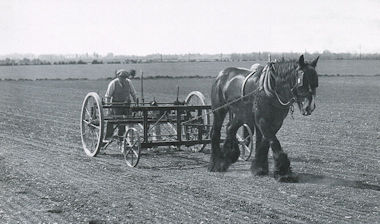W.E. Dring, 1974
This is the fifth and final part of a series of reminiscences of Trumpington in the 1920s. For an introduction to the series, see Trumpington Fifty Years Ago: Reminiscences of the 1920s.
Joining in with Trumpington’s Harvest

When summer ended and the corn was cut, we used to try and be present when the last central patch was about to fall before the binder, ready to chase the rabbits as they broke from the corn and dashed for the hedges. All the rabbits killed were collected and after the farm workers had had their pick, the rest were shared out amongst us. Those rabbit pies certainly tasted good then, but since myxomatosis they seem to have become rather scarce. When the corn had been carted from the fields, we used to glean what was left, sometimes spending whole days at it, taking food and drink with us. I used to thresh what I collected and sell it to my father for food for the chickens we kept. This money provided pocket money for a holiday in London later in the year. A frequent sight then as the day ended was a string of several huge farm horses returning to the farm, with a farm hand slumped comfortably sideways on the back of the last, swaying easily to the slow swinging walk of his mount. Each field had its name, usually based on size, like the ‘Forty-acre’, but one I remember off the Harston Road was known to the farm workers as ‘Paternoster’. There is one crop which is not grown much nowadays, but which we used to appreciated when we felt hungry, namely the kohlrabi, which was used for cattle food. Its swollen stem when peeled had a crisp refreshing flavour. Another item used for feeding sheep was the sweet locust bean and these were also very tasty.
Corn stacked in the rickyard was usually threshed in the spring. Then it was sport to gather round with sticks as first the mice would dash out as the sheaves were lifted, and then at the base of the stacks, the rats. It needed a quick eye to hit them as they shot out. I remember once bringing down one rat in mid-air as it leapt out almost into my face. One stack once seemed strangely bare of mice until the reason suddenly emerged, the snaky form and vicious pointed face of a weasel, which stared out at us, snarled and then in a flash was gone.
In those halcyon days the summers seemed longer and hotter than they are today. The grass in the meadows grew brown and crisp with drought and quite often sparks from passing railway engines would set fire to the shocks of corn and the stubble and then the fire engines would go swaying perilously down the driftways and water would be pumped out of the brook onto the smouldering corn.
Looking back, those days seemed good days, but then no doubt it was because we tend to remember the enjoyable things of the past and forget the others.